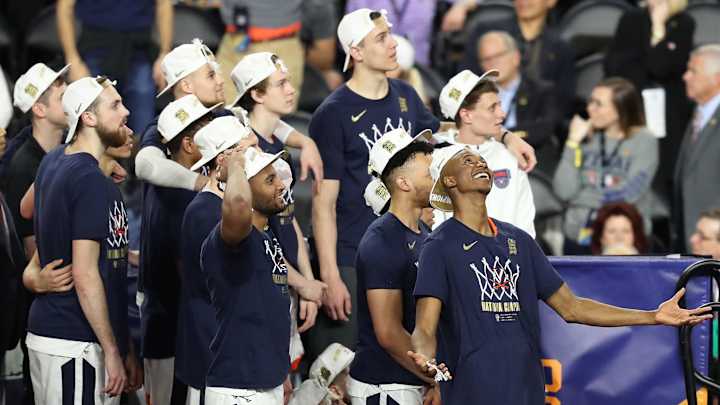Even With No NCAA Tournament This Year, 'One Shining Moment' Lives On

Every year for more than a decade, David Barrett has attended the men's Final Four. After each national championship, as the arena begins to clear, he looks up at the jumbotron and fixates on the tournament’s “One Shining Moment” montage. This year was supposed to be no different. Barrett, his wife, two daughters and son-in-law were planning on traveling to Atlanta. But amid the coronavirus pandemic, his plan, of course, changed.
Barrett is the composer of “One Shining Moment,” the song that is seemingly forever linked to college basketball's famed event. One night in 1986, at the Tavern Inn in East Lansing, Mich., he wrote its title on a paper napkin. The next day as he waited for a friend to show up to brunch, he used another napkin to finish the words, and he needed less than 30 minutes to craft its original score. While this season marks the first year without an NCAA tournament since 1938, there have been no shortage of videos set to the tune of what Barrett says has become a “sports treasure.” Instead, dozens of programs have put their spins on one of college basketball’s great traditions, producing a wave of now-viral videos documenting individual regular seasons.
“It’s usually like Christmas in March,” he says. “It’s just a joyful time that introduces you to spring. So there is a certain pall that happened as a result, of 'Oh gosh, now what am I gonna do?'”
Like millions of others across the country, Barrett was disappointed when he learned both the men’s and women’s tournaments would be canceled. During the void, he says he’s tried to stay away from his TV, knowing reflexively he’ll try and turn it on, and look for college basketball.
Instead, Barrett’s noticed a number of the tributes. Dozens of schools ranging from Montana State, Akron and Norfolk State to Kansas, Gonzaga and Wisconsin have all produced “One Shining Moment” videos. Duke’s Alumni band even published a montage cut to Barrett’s famous tune.
“That song and the montage that CBS puts together at the end of the tournament is so iconic and one of the things that people look forward to as part of the tournament every year,” says Patrick Herb, the director of brand strategy for Wisconsin Athletics. “To be able to create your own from the regular season is a fun bow to put on the season.”
Herb says the idea for a Badgers montage first popped into his mind shortly after the NCAA tournament was canceled on the afternoon of March 12. “Not unlike everybody across the country,” he makes sure to add, as evidence by the videos that soon followed.
One Shining Moment
— Wisconsin Basketball (@BadgerMBB) March 20, 2020
Frozen in time 🏆#OnWisconsin pic.twitter.com/YUdc4LURgu
Just one day later, Utah State put out its “One Shining Moment” reel. Eighteen-year-old NC State student Max Goren’s compilation went viral by Sunday, as it was one of the first, and most comprehensive montages that attempted to document the entire 2019–20 college basketball season.
For Wisconsin in particular, putting the tapestry that is a “One Shining Moment” video was made more difficult by the fact that campus buildings had closed amid the COVID-19 outbreak. Herb’s video team had to download a season's worth of clips onto an external hard drive, where UW’s Jerry Mao edited the piece remotely.
“It was fun to see all the other schools that started jumping into creating the project,” Herb says.
“It’s a historic piece now that is timeless. You could watch Wisconsin’s 'One Shining Moment' from 2020 five years from now, and it will still have all the value of this season.”
Barrett was surprised by the wave of “One Shining Moment” montages around the country. “But it’s very gratifying,” the 65-year-old composer and producer adds. “I don’t have a PR firm. So the PR firm is the song.”
On his personal website—which at one point last week shut down briefly because of all the “One Shining Moment” traffic—Barrett has a running list of some of the many montages. Among the Ann Arbor resident’s favorites have been Goren’s as well as Michigan and Michigan State’s videos.
The song’s composer takes solace in knowing that despite the tournament being canceled, there will again be “some kid in some part of this country that is shooting foul shots and maybe has the song in their mind.” Plus, in Barrett’s words, “If you write something that 35 years later holds, then that’s a good day at the job.”
Herb notes the individual montages might also have a more immediate, tangible appeal.
“I think of it as a recruiting piece as well,” he says. “I would guess that our coaches are gonna make sure that our recruits see this piece because the recruits understand the gravity of that song too.”
Whether the song is used as a recruiting tool or is merely employed as a means of catharsis, this March, the song’s importance to the college basketball community has remained as apparent as ever before.
While Barrett will miss out on the chance to watch the montage play on the Mercedez-Benz Stadium jumbotron, there are now many more moments frozen in time.
“It’s heartening,” he says. “It’s the song. There’s no one trying to convince people to like it one way or another. It’s just the impact of the song.”
